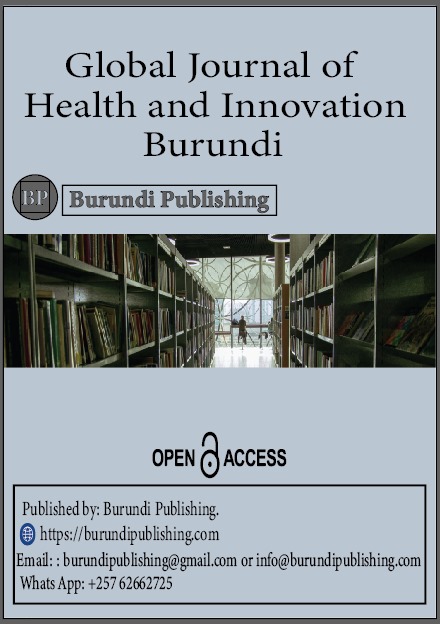Effects of Central Government transfers to Local governments on implementation of Universal Primary Education in Kiboga District Local Government. A cross-sectional study.
DOI:
https://doi.org/10.70659/gjhib.v1i11.10Keywords:
Central government transfer, universal primary education, Kiboga local governmentAbstract
Background.
Achieving Universal Primary Education as goal number 2 of the 8 Millennium Development Goals under UN Declaration of 2000 targeted to ensure that, by 2015, children everywhere, boys and girls alike, will be able to complete a full course of primary schooling. Therefore, the study intends to assess the effects of central government transfer to local government on implementation of UPE in Kiboga district local government.
Methodology.
A cross-sectional study was employed and mainly used the quantitative research method which was supported by the qualitative research methods. Simple random sampling was done to select the study participants.
Results.
62% of the respondents were male, 34(53.9%) of them were aged (50-59) years and up to 40% had secondary level education. It was strongly agreed by the respondents that schools receive conditional funds from central government (mean=4.45), most respondents strongly disagreed that funds are released based on needs assessment (mean= 2.37), a number of respondents disagreed that schools receive adequate conditional funds (mean= 2.37,), it was strongly agreed that schools conditional funds are received in time (mean= 4.45) and participants agreed that schools receive unconditional funds from Central Government (mean 4.22 strongly agreed).
“School management committees: These committees are statutory organs representing the Government at school level and are supposed to give overall direction to the operation of the school” (Bukomro Sub-county first quarter 2021/22 Education Committee report 2022).
Conclusion.
The influence of government transfers on implementation of UPE was based on Conditional and unconditional grant transfers.
Recommendation.
The ministry of finance planning and economic development in consultation with ministry of Education should review their guidelines and give school management committees more discretional powers to budget and spend the money depending on the local needs of the school.
References
Kiyaga Nsubuga, J. (2009). Local Governance and Local Democracy in. (2), 26-43. Levin, K. https://doi.org/10.5130/cjlg.v0i2.1006
A.(2006). Study design III : Cross-sectional studies.24-25. https://doi.org/10.1038/sj.ebd.6400375
Okere, A. &K. O. (2016). Nigeria's Conditional Grants Scheme in the Light of the Sustainable
Development Goals (SDGs): Lessons and Policy Options in a Post-2015 Era Nigeria's Conditional Grants Scheme in light of the Sustainable Development Goals (SDGs): Lessons and P. (August).
Asiamah, N., Mensah, H. K., & Oteng Abayie, E. F. (2017). General, Target, and Accessible Population: Demystifying the Concepts for Effective Sampling. Qualitative Report, 22, 1607-1622. https://doi.org/10.46743/2160-3715/2017.2674
Creswell, J.W. (2014). Research Design. Qualitative, quantitative, and mixed methods approach (4a ed.). Thousands of Oaks, CA: Sage. (n.d.). Retrieved August 14, 2024, from https://studylib.es/doc/1402151/creswell--j.w.--2014-.-research-design.- qualitative--quan.
Levin, K. A. (2006). Study design III: Cross-sectional studies. Evidence-Based Dentistry,7(1), 24-25. https://doi.org/10.1038/sj.ebd.6400375
Mohamod, Kasim, S. gaelle. (2014). Council for Innovative Research. Journal of Advances in Chemistry, 10(1), 2146-2161. https://doi.org/10.24297/jac.v10i1.987
Ngugi, M., Mumiukha, C., Fedha, F., & Ndiga, B. (2015). Universal Primary Education in Kenya: Advancement and Challenges. Journal of Education and Practice, 6(14), 87-96.
Wampler, B., Sugiyama, N. B., & Touchton, M. (2019). Democracy at Work: Pathways to Well-Being in Brazil. https://doi.org/10.1017/9781108675949.
Downloads
Published
How to Cite
Issue
Section
License
Copyright (c) 2024 Henry Kakande, Dr. Jean Bosco Binenwa (PHD)

This work is licensed under a Creative Commons Attribution 4.0 International License.
License Information
All articles published in the Global Journal of Health and Innovation Burundi are licensed under the Creative Commons Attribution 4.0 International License (CC BY 4.0).
This license permits:
- Sharing: You can copy and redistribute the material in any medium or format.
- Adapting: You can remix, transform, and build upon the material for any purpose, including commercially.
Attribution Requirement: Users must provide appropriate credit to the original author(s), link to the license, and indicate if changes were made.






